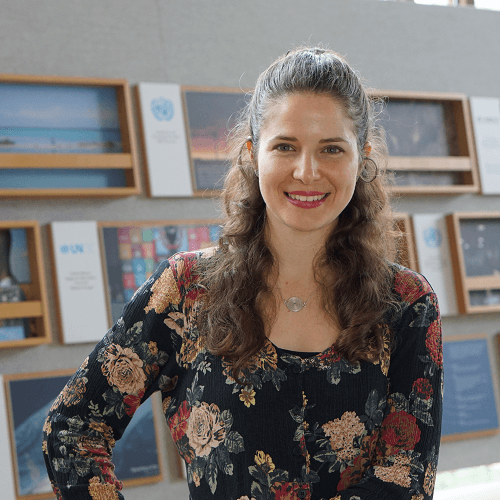Read more and apply here.
Maria del Mar Moure Peña
 Meet PhD student Mar Moure Peña and read about her work, its impact and her drive as a researcher.
Meet PhD student Mar Moure Peña and read about her work, its impact and her drive as a researcher.
Mar has a joint MSc in the Geography of Environmental Risks and Human Security from the University of Bonn & United Nations University in Germany, as well as an MA in Intercultural Relations and International Cooperation from Charles de Gaulle University - Lille III in France.
Mar is currently doing her PhD in the section for Environment and Natural Resources here at the Department of Food and Resource Economics.
What is your research about?
In a nutshell, I study how people make climate adaptation choices while simultaneously dealing with many other sources of uncertainty (personal finances, the economy, policies, health, the future!). The setting of my research is in the Maya region in Mexico, where a recent governmental program incentivizes smallholder farmers to transition from the form of slash-and-burn agriculture practiced for millennia in the region (the milpa) to agroforestry. People in the region have developed a set of strategies to deal with natural hazards, but there is a fear that climate and environmental problems will continue to worsen and make the milpa unsustainable. However, switching livelihoods to agroforestry comes with its own set of risks and uncertainties, in great measure related to the long lead times before being able to harvest. My goal is to unravel the specific types of uncertainty that may be a play in choosing to either carry on as usual or change to a different livelihood. My results thus provide insights into barriers to adaptation and can potentially inform policy design.
Why is your research important?
I believe it helps address two main issues, one in the “real world” and one in scientific research.
First, we know that we are not doing a great job in adapting to climate change, especially when it comes to the livelihoods of those most at risk. One potential barrier to adaptation is uncertainty, but not the kind of uncertainty encapsulated in confidence intervals in projections of the climate, no. Something more primal about our state of mind when making decisions, a process that involves multiple sources of uncertainty beyond just the climate. A process of weighing trade-offs, seeking information, hesitating and sometimes being in denial or forestalling action. My research about sources of uncertainty seeks to shift the focus from scientific uncertainties to decision-making uncertainties in order to identify current bottlenecks in the way livelihood adaptation alternatives are designed and implemented.
Second, guess what, disciplinary silos are real! One of my motivations to join IFRO was to become more familiar with environmental economics theories and methods. In my previous academic field of disaster risk reduction people were still talking about human behavior as a “black box”. For instance, they would be puzzled about why some people risk their lives by not evacuating to a shelter during a cyclone despite being timely alerted. Of course people do not necessarily make “rational” decisions when facing disasters, at least not based on the same premises for rationality that risk managers use. There is a long and vast literature on decision-making and behavior from disciplines such as economics or psychology, but often scientist confine themselves to research conducted in their fields and ignore knowledge produced in others.
In my research, I try to bypass those silos by combining theories and methods from different disciplines based on their relevance to analyzing bits of a very big and intricate problem. When disseminating my results, I also try to reach the people for which the topic is relevant rather than speaking to the few in a very specialized field
What excites you most about your work as a PhD student at IFRO?
I enjoy the process of pivoting towards a new scientific discipline and the “aha” moments that come with it. Being surrounded by people with different disciplinary backgrounds and lived experiences is stimulating. Also, all my colleagues are very friendly and helpful, so I feel encouraged to spontaneously ask for help or feedback. The PhD format is different from many other countries: it is more condensed (only three years) but still very varied, as we are expected to get some experience teaching or supervising, being involved in the department’s organization and events, have a scientific stay abroad, and present our work in relevant conferences. I like the diversity of tasks that comes with this format, as it provides us with an opportunity to develop project management skills.
And most importantly, the work environment and especially the community of PhDs is great, so I always look forward to going to the office.
What drives you as a researcher?
Equal parts of curiosity and a sense of responsibility. I love that research is anchored on learning, because I am naturally a curious person. But I also choose to research topics that I think are important, and where more attention is needed. My current PhD research is important to me also at a personal level because one of my case studies is the small Maya village where I grew up as a child, so I am very familiar with the struggles that smallholders face. It feels like going full-circle: those childhood years were very formative, and I get to go back and combine the context-specific and cultural understanding I got from living there with some of the knowledge and skills I learned later in life.
Check out Mar's research profile here.
